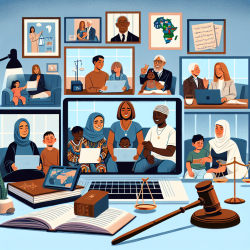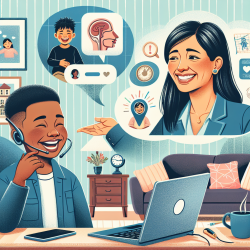Introduction
In the ever-evolving field of speech-language pathology, practitioners are constantly seeking ways to improve their skills and outcomes for children. One often overlooked area is the inclusion of diverse populations, such as LGBT individuals, in therapy practices. A recent research article titled "Regional Legal and Policy Instruments for Addressing LGBT Exclusion in Africa" by C. Izugbara et al. offers valuable insights that can help practitioners enhance their approach to therapy by understanding the broader socio-legal context affecting LGBT individuals.
Understanding the Research
The research highlights the vulnerability of LGBT persons in Africa due to their exclusion from socio-economic opportunities and services. It identifies seven key regional legal and policy instruments formulated by the African Union (AU) that aim to tackle this exclusion. These instruments, although not explicitly mentioning LGBT individuals, emphasize the importance of inclusion and protection of all citizens, regardless of their sexual orientation.
Key Takeaways for Practitioners
As a practitioner, understanding the socio-legal framework affecting LGBT individuals can enhance your ability to provide inclusive and effective therapy. Here are some key takeaways from the research:
- Awareness of Legal Frameworks: Familiarize yourself with the legal and policy instruments that promote inclusion and protect the rights of LGBT individuals. This knowledge can inform your practice and help you advocate for your clients.
- Promoting Inclusivity: Implement practices that promote inclusivity and respect for diversity in your therapy sessions. This can create a safe and supportive environment for all clients, including those from marginalized communities.
- Advocacy and Education: Use your position as a practitioner to advocate for policies that support the inclusion of LGBT individuals in therapy and other services. Educate yourself and others about the challenges faced by these communities and the importance of addressing them.
Encouraging Further Research
While the research provides a valuable foundation, there is still much to learn about the specific needs and challenges faced by LGBT individuals in therapy. Practitioners are encouraged to conduct further research and share their findings with the broader community. This can help develop more targeted and effective interventions that address the unique needs of LGBT clients.
Conclusion
By understanding and implementing the insights from this research, practitioners can enhance their skills and create better outcomes for all clients, including those from LGBT communities. The legal and policy instruments discussed in the research provide a framework for promoting inclusion and protecting the rights of marginalized individuals. To read the original research paper, please follow this link: Regional legal and policy instruments for addressing LGBT exclusion in Africa.










